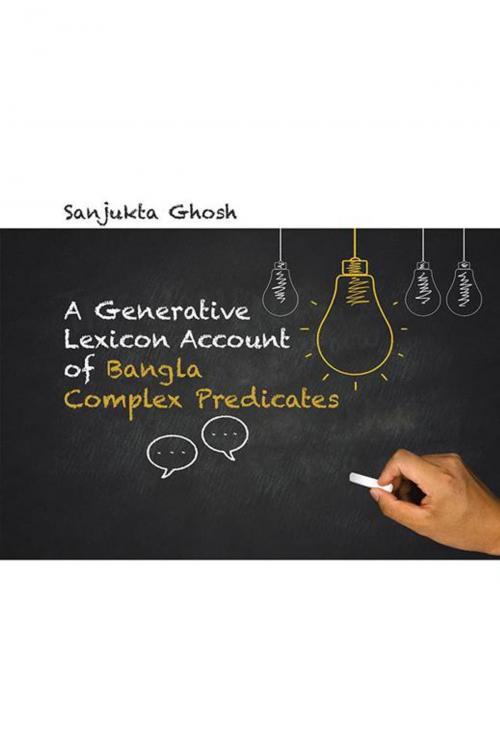A Generative Lexicon Account of Bangla Complex Predicates
Nonfiction, Reference & Language, Foreign Languages, Education & Teaching| Author: | Sanjukta Ghosh | ISBN: | 9781482847284 |
| Publisher: | Partridge Publishing India | Publication: | March 28, 2015 |
| Imprint: | Partridge Publishing India | Language: | English |
| Author: | Sanjukta Ghosh |
| ISBN: | 9781482847284 |
| Publisher: | Partridge Publishing India |
| Publication: | March 28, 2015 |
| Imprint: | Partridge Publishing India |
| Language: | English |
This book is an attempt to provide a corpus based account of Bangla complex predicates and represent them in a structured lexicon suitable for further information processing useful in any Natural Language Processing (NLP) works. The framework which is adopted in the book for representation of the complex predicate is Generative Lexicon proposed by James Pustejovsky. Bangla has mainly three kinds of complex predicates which are extensively used in the language, viz., Adjective-Verb conjunct predicates, Noun-Verb conjunct predicates and Verb-Verb predicates known as compound verbs in the literature. There are three very important outcomes of this research work, none of them has ever been attempted for any Indian languages and all of them are crucial from both theoretical as well as applicational point of view. First, it provides a classification of adjectives of Bangla based on their behavior when attached in a conjunct verb. This classification is based on the semantic properties of the adjectives. However, it also provides information about their syntactic behavior, viz., which semantic class goes with which verb in a conjunct verb frame in the syntax. Secondly, it also attempts to classify the nouns of Bangla used in Noun-Verb conjuncts. This classification is based on the syntactic frames in which they appear when used in a Conjunct Verb construction. Thirdly, the work creates verb frames for the complex predicates of Bangla. Verb frames are syntactic frames or environment where these verbs occur. They are able to provide important information about their argument structure both types and kinds of arguments. The book will be useful for researchers working in theoretical linguistic issues like argument structure, semantics of complex predicates etc in general. The book uses a powerful knowledge representation framework Generative Lexicon for the representation of the complex predicates and can be used in the area of applied Artificial Intelligence and Natural Language Processing.
This book is an attempt to provide a corpus based account of Bangla complex predicates and represent them in a structured lexicon suitable for further information processing useful in any Natural Language Processing (NLP) works. The framework which is adopted in the book for representation of the complex predicate is Generative Lexicon proposed by James Pustejovsky. Bangla has mainly three kinds of complex predicates which are extensively used in the language, viz., Adjective-Verb conjunct predicates, Noun-Verb conjunct predicates and Verb-Verb predicates known as compound verbs in the literature. There are three very important outcomes of this research work, none of them has ever been attempted for any Indian languages and all of them are crucial from both theoretical as well as applicational point of view. First, it provides a classification of adjectives of Bangla based on their behavior when attached in a conjunct verb. This classification is based on the semantic properties of the adjectives. However, it also provides information about their syntactic behavior, viz., which semantic class goes with which verb in a conjunct verb frame in the syntax. Secondly, it also attempts to classify the nouns of Bangla used in Noun-Verb conjuncts. This classification is based on the syntactic frames in which they appear when used in a Conjunct Verb construction. Thirdly, the work creates verb frames for the complex predicates of Bangla. Verb frames are syntactic frames or environment where these verbs occur. They are able to provide important information about their argument structure both types and kinds of arguments. The book will be useful for researchers working in theoretical linguistic issues like argument structure, semantics of complex predicates etc in general. The book uses a powerful knowledge representation framework Generative Lexicon for the representation of the complex predicates and can be used in the area of applied Artificial Intelligence and Natural Language Processing.















